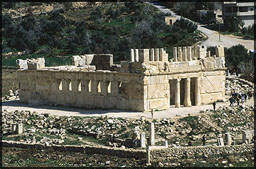 BUILDING A NEW FRAMEWORK FOR TRADE AND INVESTMENT BUILDING A NEW FRAMEWORK FOR TRADE AND INVESTMENT |
Jordan is a small country with a population of only 6.3 million people, yet one of its strengths is its geographical position - Jordan shares borders with Israel, Syria, Iraq and the United Arab Emirates, establishing it as an ideal centre for intra-regional and international trade.

"Jordan is the only place to be the true gateway to business in the region" said the Minister of Industry and Trade, Mohammad Halaiqa. Jordan is currently positioning itself by establishing trade agreements with Iraq, Kuwait, Lebanon, Syria, Egypt and Turkey. It is also taking a leadership role in the creation of a Arab economic bloc which would encourage commercial cooperation in the region.
"We strongly believe that the barriers which impede the flow of trade between Arab countries should be removed. We are actively engaged with other Arab countries to establish an Arab Free Trade Area" said Abdel-Elah Khatib.
Moreover, Jordan has been active on the international circuit. Along with an agreement with the IMF in early 1999 which will provide new loans over the next three years, Jordan has signed an Association Agreement with the EU and has joined the World Trade Organisation. There has even been talk of a possible Free Trade Agreement with the US.
"Joining the WTO was very important to us" states Halaiqa. "We have always thought that we should integrate into the global economy at this stage. Through this exercise we have studied our economic legislation, we have amended laws, we have created new laws, and I believe that now we have a very transparent and sound investment environment."
In order to enter the global market, important legislative reforms were necessary. Last year a new Intellectual Property Law was adopted, ensuring patent protection and pushing local companies to comply with international property laws. A new Investment Promotion Law is being drafted, providing income tax exemptions, decreasing custom duties and allowing foreign investors to own 100% of shares in most Jordanian companies. | 
Jordan is also the only country in the region with Qualified Industrial Zones (QIZ), which allows companies within the zones to export their products duty and quota free to the USA. There are currently four QIZs in Jordan, and the two-year old program was so successful that a fifth zone will be launched this year on the Jordan-Israeli border.
"We already have several companies established in Jordan's QIZ, about US$ 46 million worth of investments, employing about 3000 people, and now we have about US$ 130 million of investments in the pipeline", said Mrs. Reem Badran, Director General of the Jordan Investment Board (JIB), a government entity created in partnership with the private sector to promote foreign investment into Jordan.
Partnerships is a new concept in Jordan, and recently the King created the Economic Consultative Council - a young, westernised group of public and private sector reformers who are advising the King on issues such as privatisation, government downsizing, elimination of corruption and education reform.
Although the government's privatisation process was stalled in the past, renewed efforts led to the first successful privatisation deal in Jordan: the sale of government shares in the Jordan Cement Factories Company to the Lafarge Group. The deal kick-started Jordan's privatisation process, and last year the government sold its shares in the Jordan Telecommunications Corporation (JTC) to France Telecom. This year the national railway corporation was also sold to an international consortium.
The process has only begun, and the government has now announced the privatisation of the national airline, Royal Jordanian, and the privatisation of its postal services. Major changes will also take place in the Energy and Mining sector: the national generation and distribution companies are slated for privatisation as well as the National Petroleum Company and the Petra Drilling Company. |

